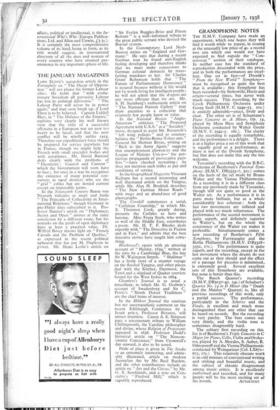THE JANUARY MAGAZINES
LORD ELTON'S outspoken article in the Fortnightly on " The Decay of Opposi- tion " will not please his former Labour allies. He holds that " with evolu- tionary Socialism all pervasive Labour has lost its political differentia." " The Labour Party will never be in power again," and may soon break up, if Lord Elton is to be believed. Captain Liddell Hart, in " The Defence of the Empire," explains very clearly his well known view that the risks of a successful offensive in a European war are now too heavy to be faced, and that the next conflict will be wholly unlike 1914. Therefore our expeditionary force should be prepared for service anywhere but in France, though we might help the French with small specialist bodies and with aeroplanes. Mr. David Barrend deals clearly with the problems of " Electricity : Control and Current " which the Government will soon have to face ; for once in a way he recognises the existence of many potential con- sumers in rural districts who see the " grid " cables but are denied current except on impossible terms. In the Nineteenth Century Baron von Neurath ridicules as inept and futile " The Principle of Collectivity in Inter- national Relations," though Germany in pre-Hitler days subscribed to it. Pro- fessor Namier's article on " Diplomacy, Secret and Open " arrives at the same conclusion by a different route, but his remarks on the perils of open diplomacy have at least a practical value. Dr. Wilfrid Bovey throws light on " French Canada and the Problem of Quebec," as expressed in the recent political upheaval that has put M. Duplessis in power. Mr. Shane Leslie's article on
" Sir Evelyn Ruggles-Brise and Prison Reform " is a well-informed tribute to the great public servant who devised the Borstal system.
In the Contemporary Lord Noel- Buxton writes on England and Ger- many." He says that during a recent German tour he found anti-English feeling developing and therefore thinks that we must make concessions to German colonial demands by trans- ferring mandates to her. Sir Charles Grant Robertson holds that " The Future of Parliamentary Democracy " is assured because without it life would not be worth living for intelligent people ; he will not admit that the despots are any more efficient than we are. Mr. S. H. Steinberg's enthusiastic article on " The National Portrait Gallery " may draw attention to a collection that relatively few people know or value. In the National Review " Anglo- American " criticises " The Proposed Agreement with U.S.A." as a " Socialist" move, designed to assist Mr. Roosevelt's " left wing policies " and to counter- balance the " Berlin-Rome-Tokyo axis." General Sir Herbert Bryan, writing on " Back to the Army Again," suggests that unemployment allowances and the League of Nations Unicn—" the per- nicious propaganda of provocative paci- fists "—have checked recruiting ; he does not mention such trifles as pay and conditions of service.
In the Geographical Magazine Viscount Kelburn has a second interesting and well illustrated article on the Yangtse, while Mr. Alan H. Brodrick describes " The New German Motor Roads " with maps and an abundance of good photographs. The Cornhill commences a serial, " Carlylean Courtship," in which Mr. E. Thornton Cook, greatly daring, presents the Carlyles as hero and heroine. Miss Freya Stark, who writes so well of the Middle East, contributes a poem. Mr. H. T. F. Rhodes deals expertly with " The Detective in Fiction and in Fact," and admits that the best detective stories have taught him some- thing.
Blackwood's opens with an amusing account of " Henley, 1839," written at the time by a Cambridge Blue, the late Sir W. Warington Smyth. " Shalimar " has a lively story of a steamer voyage on the flooded Yangtse, and other pieces deal with the Khyber, Dartmoor, the Tyrol and a shipload of Quaker convicts bound for the West Indies in 1664.
Chambers's Journal is as usual a miscellany, in which Mr. G. Godwin's account of Swedenborg and Sir C. Petrie's " North Dorset Traditions " are the chief items of interest.
In the Hibbert Journal the cautious but not unsympathetic comment on the recent Edinburgh Conference by a Jesuit priest, Professor Bevenot, will attract attention. Canon A. E. Simpson pays a tercentenary tribute to William Chillingworth, the Caroline philosopher and divine, whose Religion of Protestants appeared in 1638. Professor Dodd's historical article on "-The Noncon- formist Conscience," from Cromwell's day onward, is also to be noted.
Pride of place is given in The Studio to an extremely interesting, and admir- ably illustrated, article on modern Australian Art by Mr. Basil Burdett, and the other contributions include an article on " Art and the Circus," by Mr. G. S. Sandilands, and a note on Con, stable's " Flatfo;c1 Mill," which is superbly reproduced.









































 Previous page
Previous page